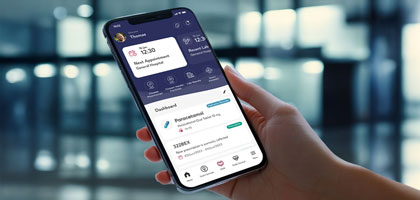
Blog
This Month in Healthcare IT: Remarkable e-Health News in May
In the constantly changing world of healthcare IT technologies, staying ahead demands continuous innovation and knowledge. At Tiga Healthcare Technologies, we closely follow the latest industry reports, global trends and new regulations to ensure our progress and sustained leadership in healthcare IT technologies.
Learning is the driving force behind our mission to transform global healthcare IT technologies for better patient outcomes. This blog series underlines our duty, delivering insights into the groundbreaking advancements that boost our progress. We're delighted to emphasize the key healthcare IT developments that have caught our attention this May.
Here are the top 11 news that have inspired us:
1. The OECD released a guide titled 'AI in Health - Huge Potential, Huge Risks' that involves driving AI applications in health within country policies.

OECD published a guide about collective action across countries and regions to assess AI risks, remove barriers and pave the way for responsible AI. Additionally, this report involves case studies that analyze gaps in AI applications in health and health-related AI incidents, aiding through knowledge and experience hub for creating policy development and toolkits.
Also, the OECD offers support for countries to benchmark the development of AI policy in health, boost knowledge sharing and track good practices for collective learning and response for beneficial outcomes.
Source: https://www.oecd.org/health/AI-in-health-huge-potential-huge-risks.pdf
2. The European Parliament released a study titled 'Addressing challenges to European multi-country collaboration models for rare diseases,' emphasizing the significance of electronic health records.

This new report and study from the European Parliament look at aspects of treating rare diseases that make expertise and treatment challenging due to their low prevalence. Researchers present six policy options for in-depth multi-country collaboration between centers responsible for treating rare diseases, using electronic health data and focusing on real-time data sharing. These options include direct access to real-time medical data for patients and the creation of a central European Union body for a data ecosystem.
Source: https://www.europarl.europa.eu/thinktank/en/document/EPRS_STU(2024)757794
3. ONC report titled 'Interoperable Exchange of Patient Health Information Among US Hospitals: 2023' provided insight into hospital data interoperability status across the US.

A new report by the Office of the National Coordinator for Health IT (ONC) shows progress in how US hospitals share electronic health information. There's been a jump in hospitals routinely exchanging all key data types from 28% in 2018 to 43% in 2023. However, challenges remain. While most hospitals can send data electronically, only 75% can integrate received data into their systems. Additionally, larger hospitals are more likely to routinely exchange data than smaller facilities.
The report highlights the importance of moving towards routine data exchange for better patient care. It also emphasizes the need to address the gap in capabilities between different hospitals and improve data exchange with other healthcare providers, namely healthcare interoperability.
4. The Australia Productivity Commission's 'Leveraging Digital Technology in Healthcare' paper noted that the My Health Record (MHR) System faces challenges but has the potential for $3.8 billion in annual savings.

The My Health Record (MHR) is an electronic health record system that aims to centralize health information to enhance care coordination and patient safety. The Australia Productivity Commission's recent report highlights that despite a $1.3 billion investment, the My Health Record (MHR) system still suffers from incomplete records.
The report calls for more efficient data search capabilities, user-friendly displays, better integration into clinical workflows and incentivizing software providers. Additionally, the government is collaborating with HL7 to standardize FHIR standards to address uncoordinated information management. The commission estimates that improved use of EMR data could save care providers up to $3.8 billion annually.
Source: https://www.pc.gov.au/research/completed/digital-healthcare
5. The European Commission adopted a 'Communication on the European Health Union,' highlighting health policy progress over the last four years.

The European Commission adopted the 'Communication on the European Health Union,' which showcases the progress in European Union health policy over the past four years. It emphasizes EU solidarity, collaboration and decisive action through initiatives like the EU Vaccines Strategy.
The emergence of the European Health Union underscores its importance in preserving EU resilience, societal well-being, strategic autonomy and geopolitical stability. It responds to citizen calls for a stronger presence in public health with tangible results, for example, health security measures, access to affordable medicines, a Cancer Plan, digital healthcare initiatives, patient safety regulations and a One Health approach to address major health risks.
Source: https://ec.europa.eu/commission/presscorner/detail/en/ip_24_2523
6. Saudi Arabia launched a unified platform for the Medical Referral Centre to advance the country's medical services further.

The Medical Referral Center is a unified platform and a national milestone that streamlines the management of medical referrals, oversees capacity and bed utilization and facilitates treatment requests across regions and beyond Saudi Arabia. It establishes standardized procedures and regulations, supported by an electronic platform, to ensure transparent and real-time information exchange on hospital capabilities. This initiative aims to minimize patient wait times, improve healthcare access and align with the goals of the health sector transformation program under the Kingdom’Kingdom's2030.
Launching the unified platform for the Medical Referral Center underscores the Ministry of Health's intent to advance healthcare services in line with Vision 2030 objectives. This initiative reflects the broader vision of promoting accessibility and excellence in healthcare services, contributing to the overall transformation of the healthcare IT sector.
Source: https://www.moh.gov.sa/en/Ministry/MediaCenter/News/Pages/News-2024-05-21-001.aspx
7. The European Commission enhances access to medicines with clear guidelines for joint clinical assessments.

The European Commission has adopted new rules for joint clinical assessments of medicines at the European Union level, aimed at speeding up citizens' access to medicines. These rules establish timelines and procedures for conducting these assessments. The resulting reports will aid healthcare authorities in evaluating the value of medicines with strong evidence, enabling more effective and timely decisions regarding their use in national health systems and their market introduction.
The rules are adopted under the Regulation on Health Technology Assessment (HTA). This regulation introduces an innovative approach by pooling expertise from across the European Union to evaluate the effectiveness of new medicines, supporting healthcare systems in delivering quality care using the latest technologies.
8. New Zealand develops national healthcare interoperability standards with 'Core Data for Interoperability.'

New Zealand's Health Information Standards Organisation (HISO) is creating new health information exchange standards for the entire country. The goal is to attain complete interoperability within New Zealand's digital health ecosystem. As part of the update to the country's Interoperability Roadmap, HISO is developing the New Zealand Core Data for Interoperability (NZCDI) program. Modeled after the United States' Core Data for Interoperability standards, the NZCDI program aims to establish standards for the most frequently shared health data in clinical workflows and patient access to this data.
9. The Workgroup for Electronic Data Interchange (WEDI) offers recommendations in a letter to the HHS about preventing cyberattacks against healthcare systems.

The Workgroup for Electronic Data Interchange (WEDI) urges the US Department of Health and Human Services (HHS) and other federal agencies to enhance support for healthcare systems amidst growing risks of cyberattacks. Concerned about the threats, WEDI proposes various measures to mitigate the impact of cyber incidents and ensure uninterrupted data exchange and care delivery. These recommendations include proactive audits by the HHS Office for Civil Rights (OCR) to identify best practices, educational campaigns to aid covered entities in managing cyber risks and the development of minimum standards for accreditation entities. By advocating for these measures, WEDI seeks to ensure the continuous exchange of information and quality of patient care delivery.
Source: https://www.wedi.org/assets/pdf/WEDI+Letter+to+HHS+on+Cyber+5.16.24+Final/
10. South Korea announced a $17 million project to develop an AI-based clinical decision support system.

South Korea's Ministry of Health and Welfare is investing $16.7 million over five years in an AI-driven project to develop a clinical decision-support system for emergency departments. Around 10,000 junior doctors in South Korea have been on strike since February, putting pressure on emergency departments.
The project, involving five major hospitals and the National Emergency Medical Center, aims to establish a clinical decision-support database, optimize treatment processes, create an AI model for emergencies and predict conditions like cardiac arrest. The initiative addresses critical issues such as the shortage of emergency medical resources and inadequate emergency care in non-metropolitan areas.
Source: https://www.healthcareitnews.com/news/asia/korea-turning-ai-resolve-er-crisis
11. ONC announces new funding for AI data quality and healthcare IT innovations in the US.

The Office of the National Coordinator for Health IT (ONC) is offering new funding for AI innovations in data quality and technology adoption in health as part of its Leading Edge Acceleration Projects in Health IT initiative for fiscal year 2024. The funding targets two main priorities: developing scalable solutions to improve the quality of healthcare data used by AI tools and accelerating health IT adoption in behavioral health to enhance care coordination.
This initiative is a significant step in ONC's ongoing efforts to enhance healthcare technology and data transparency. It aligns with the recent HTI-1 final rule, which mandates transparency for AI and predictive algorithms in certified health IT products. By focusing on these areas, ONC aims to significantly improve patient care and coordination in healthcare settings.

As the latest news highlighted, digitalization with proper implementation is healthcare success's future in 2024 and beyond. At Tiga, we support you at every step of your healthcare IT journey with customizable data management and analytics solutions and guidance.
For instance, we can respond to the electronic health records systems that many countries, like Australia and the US, are trying to upgrade with Personal Health Record (PHR). Moreover, our Healthcare Interoperability products can help countries and regions like the European Union to move toward a more efficient healthcare ecosystem with standardized data exchange.
When it comes to AI solutions that are gaining popularity worldwide, we are here with our AI & Analytics product family. We strengthen predictive analytics with our early warning system Predis or provide data anonymization with Autononym, complying with all gold security standards to eliminate risks.
We aim for a better future for healthcare systems and offer reliable products that comply with global standards for increased accessibility and better patient outcomes. This vision gives valuable results with our Healthcare Interoperability, Patient Engagement, Prescription and Medicine Management, Drug Traceability, AI & Analytics, Population Health Management, Personalized Healthcare and Hospital Information System product families.
We're not just coding the future of healthcare IT technologies; we're architecting it.
Let's shape the future together, as always!









